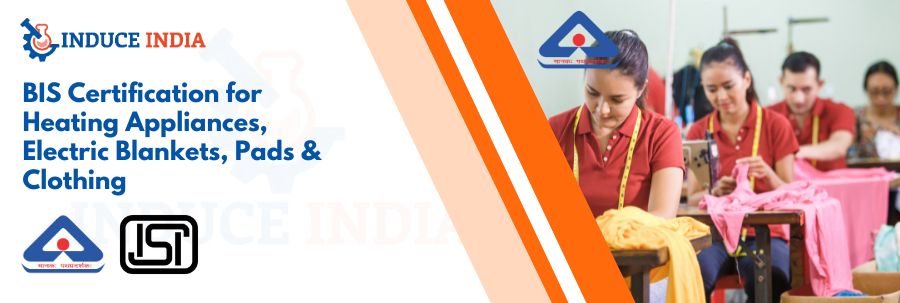The use of heating appliances, electric blankets, pads and climate clothes is also getting mainstream in India, especially in colder parts and in winter. Since they were used to keep the home warm and comfy, they can now serve the purpose of keeping one relaxed even when they are outdoors; these are appliances that are now almost a requirement for most households. As more people use these products, however, it becomes the duty to make such products safe and reliable. So, here, BIS (Bureau of Indian Standards) Certification for Electrical Appliances makes an appearance.
The BIS certification guarantees that heating systems, electric blankets, pads and clothing are of high quality and safe use. It serves as a source of confidence to both the manufacturers and consumers. We shall take you through the significance of the BIS certification, the standards through which they are done, the process and why manufacturers and users should apply them in this blog.
Overview of BIS Certification
India BIS: This is the national standards body in India, which sets and implements product safety and quality standards. It aims at shielding consumers against unsafe or incompetent products and also advocating for high-quality manufacturing procedures.
Electric wearable items and heating appliances are dangerous when not designed and made well. They comprise electricity, heat, as well as physical contact with the body. Made products with poor design may result in overheating, electric shocks or even fire hazards. However, BIS certification ensures that all such products are subject to intense testing and are in line with the Indian safety standards.
Significance of BIS Certification on Appliances used in heating
Allowable risks are involved in the heating equipment and electrified wearables like electric blankets and hot clothes, because of the presence of both electricity and heat. The accident that can arise out of the use of uncertified products may instead be a burn, a short circuit due to electricity or a fire.
To consumers, BIS certification provides them with a measure of safety, performance and durability. It also ensures that the product is tested in electrical insulation, overheating, leakage of current and the quality of material used. As a manufacturer, it not only provides credibility but can be used to guarantee legal compliance because selling non-certified appliances in India is an easily penanced offence that may lead to legal hassles.
Major Products that are under BIS Certification
The types of products that will be subject to BIS certification are:
- Heating Appliances: Electric heater, fan-connected heater, convectors, oil-filled radiators and others used in warmers of the indoor space.
- Electric Blankets: Blankets used at home that have heating coils embedded into them to keep people warm.
- Heating Pads: Electric pads: electric pads to gain therapeutic or personal warmth when applied to the bed or chair, or even for medical use.
- Heated Clothing: Clothing used for Outdoor or professional wear that is built in with heating elements.
Some of these products possess certain Indian Standards upon which these products are tested in the fields of electrical safety, heating performance and durability.
Applicable BIS Standards
The primary standards of heating appliances and products thereof are the ones under the reach of IS 302 (Part 1) that accommodate the safety standards of household electrical appliances. Other applicable standards are the IS 13252 of electrical insulation and hazard protection, and other standards of material quality and temperature constraints.
In the case of electric blankets and pads, the tests performed are: inspection of insulation of heating element, proper control of temperature and wear and tear. In the case of heated attire, additional tests, such as product safety when in contact with the human body, are to be done in response to movement or negative outlier conditions.
The BIS Certification Process for Electronics & IT Products
The process of obtaining the BIS certification of heating appliances and electric wearables is systematic in nature and aims to have in place a good qualification of safety and quality checks.
Application Submission: The manufacturers/ importers should present an application to BIS together with an explanation of the product, manufacturing processes, records of quality control and technical specifications.
Product Testing: Compliance with Indian standards is done by testing products in BIS-recognised laboratories. Examples of tests are electrical insulation, heat output, ability to withstand overheating, durability, and safety in the case of long-term use.
Factory Inspection: BIS can make use of an on-site visit in the manufacturing unit to observe quality control procedures and ensure that the production practices are in line with BIS norms.
Certification Approval: It is the BIS that is given once the product successfully passes the testing and inspection section, and the manufacturer is free to implement the ISI mark on the product. This signal is a noticeable indication of assent and security among the customers.
BIS Certification Advantages
BIS certification benefits not only manufacturing and importing companies (manufacturers) but also consumers:
- To Manufacturers: It gives credibility, makes it acceptable in the market and minimises the threat of legal engagements. Retailers and buyers are likely to stock and trust certified products, respectively.
- When looking at Consumers: It assures safety, reliability and stability. Customers may be certain that electricity blankets, electropads, and garments will be safe and will work properly at all times.
- To the Market: Certification fosters the compatibility of the overall standard of goods in the Indian market, thereby lessening threats of defective appliances.
Consumer Safety Concerns
Whereas BIS certification has guaranteed the safety of heating appliances and electric wearables, it is required that consumers operate them safely. The user always reads the manual, does not use the electrical system to its full capacity, or potentially puts the products in close contact with water. Check the heating components, cords and plugs regularly to determine if they are worn or damaged. Always avoid using uncertified products because they may lead to the development of serious fire or electric shocks.
Issues in Certification
Although the process is desirable, its weaknesses include the issues of documentation, changes made to the products so that they align, and the expenses during testing. Depending on the requirements made by the Indians, the importers might need to make some modifications to fit products manufactured in other countries in such a way that they fit the Indian standards. Nevertheless, in spite of these obstacles, BIS certification is essential in the modern era of safety safety-conscious market.
BIS Certification and International Trade
BIS certification is obligatory for specific product categories to be sold in India by foreign manufacturing companies that would like to sell heating appliances and electric wearables. Although other countries may have certified products, they might still have to change them so that they can meet the standards of safety in India. Before exporting its products to India, the exporters have to deal with the BIS authorised agents and also ensure that the products are properly tested before entering the Indian market.
ISI Mark: The Symbol of Trust
The closest symbol of BIS certification is the ISI mark. This mark indicates that the product has undergone rigorous safety and quality checks and tests in the case of heating appliances, blankets, pads, and other clothing. Before they acquire any electric heating products, it is important that consumers also certify the ISI mark in order to have assurance.
Future of BIS Certification in India
BIS certification will be of the essence as more people are becoming aware of the safety and quality of the household appliances market in India. The next standards might involve eco-friendly products, energy efficiency needs, and improved performance specifications of the electric wearables. This will not just increase the safety of consumers, but also sustainable manufacturing.
Conclusion
The BIS certification of heating appliances, electric blankets, pads, and other clothing is not just a serf and dunce regulation, but a boon of conformity, consumer confidence, and quality. To companies involved in production and importation, it is an entry point to the Indian market, coupled with establishing trust. To the consumer, it assures them that the product they are using, whether at home or out in the fields, is safe, durable as well and reliable.
The services will be safer and more pleasant to all as India is still taking up modern gadgets and wearable applications with higher damage protection through BIS-certified products. As a manufacturer, importer, retailer, or consumer, knowing the relevance of BIS certification is very important in the increasingly expanding electrical appliance business community today.



